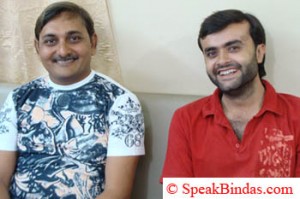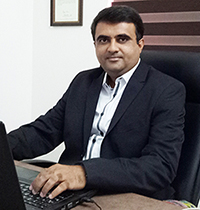
Kamlesh Bhatt
Gujarati Novelist Shri Kamlesh Bhatt has set a landmark by his very first Gujarati Novel, Samparshvik Hani (Collateral Damage). The novel was published by Wide Margin Books, Rajkot. The novel has become a rare and concerned piece of a contemporary high profile issue of Gujarat. Speakbindas had a chance to talk about the novel, the mise-en-scene and the novelist’s vision, mission…with the author. This interview will help the readers to understand the relation between the Sarjan (a piece of literature) and the Sarjak (author).
Videos of the Interview
Part 1
Part 2
Excerpt of the interview
Q: The title of your first novel sounds bit difficult to pronounce and understand. What is the meaning of the title Samparshvik Hani?
- A: Samparshvik Hani is not co-ined word, it is imported word from Hindi language. If we try to find out the similar phrase in English language, the phrase is Collateral Damage. This phrase was, for the first time, used by American army during the Vietnam war. The phrase was used for the damage people go through during the war, it is mainly an undesired and yet inevitable damage. The phrase and the concept was an excuse of the American army. There is no parallel word or phrase in Hindi or in Gujarati.But Samparshvik Hani is in that sense innovated and used in this novel.
Q: What is the story all about?
- A: If we start talking about the novel with the theme of the novel, it is Collateral Damage itself. Though the damage is collateral one, unintentional and inevitable, the damage takes place. This is the theme of the novel. The theme can take place in any milieu, it can be in Vietnam war, in Africa…In this novel the milieu is a small village which is affected by the construction of a massive dam.
Q: The story, its reach and its dimensions are wide…
- A: The spectrum of the story is not wide but the theme and the message of the story is international, it is micro and macro as well.
Q: Why you have choosen this story and theme only?
- A: Collateral damage is something which happens in everyday life. Like if the municipality decides to widen the road, the demolition of the some part of somebody’s home is evitable. The increasement of socity’s comfort may put someone in trouble, this is also a collateral damage. Now the same can also be seen in Vietnam war or anywhere. The selection of the subject and plot , to justify this wide theme, have to be that much strong. I tried to find out the plot and I landed to this subject. I don’t know why but people prefer to do not talk and write about this subject. Even the issue was not taken up in the essays. I took it on my hand and tried my level best to justify the subject.
Q: Generally it is seen that the first novel of the novelist is subjective, the personal experiences are used to make the story. While the same is not seen in your first novel, why?
- A: Those who use themselves as the characters of their novel, they write on the basis of the experiences, it’s a lack of their creativity, I believe. Because when you are writing something, you are the God, you can create any kind of character you want. If you change only a trait of a character, you can create an altogether different character and if you have this enormous power coming out of creativity, why you need to portray yourself in the character. For this kind of self portrayal, I believe, autobiography is a more suitable form.

Vikas Rajpopat with Kamlesh Bhatt
Q: To become Gujarati writer is a non-glamorous job. You are coming from a very diverse profession, how and why this transition you made?
- A: One of my best friends, Dushyanth Goswami, in the first meeting itself, told me that you should write. I love to express. I love to explore the different ways of expression. There are so many people who insisited me to write like my friend Samirbhai used to ask me to write article etc…But Dushyanthbhai told me something else. He told me to write a novel. That was a surprise to me. That time I even was not reading novels. I told him that I am a man of sociology, political science, law, Finance…but not a man of literature. He told me that the way you express yourself, I can see the characteristics of a novelist in you. The difference between what he told me and other insisted me, he had conviction. He logically explained me the point. That worked as the seed for me. Meanwhile I got transfer to Ahmedabad. You can have that hubbly bubbly images in your mind for a writer that he must be having a garden to write. He would be writing under a tree, having something to smoke etc…But I wrote the novel when the furniture work of my home was going on. I had that seize-fire time between the orders of the carpenter and the seed had started to take the shape…
Q: Does it any time happen that your being writer harms your being an Income tax officer?
- A: No.Never. Rather both have complementary relation with each other.
Q: What kind of toil you took to write the novel?
- A: I did ample research for the subject. I worked very intensively to come out with this novel. As Ayn rand says that the experiences and the research fills up the subconscious storage of the mind of the author. No writer has that supernatural power to write without the research.
Q: What’s next after Samparshvik Hani?
- A: I am planning to write a book on the technical subject related to the Income Tax. After the immense response to the novel Samparshvik Hani, I think that I should write another novel. The different plots and concepts are coming and getting disappeared.When the symphony of thought, emotion and skill can be created, one can write.
Q: What is the message you want to give to your fans and readers?
- A: Read the novel with space,. Never take any novel taken for granted and never makes jumps to one paragraph to another so you can get a chance to feel the imagination and the experiences of the author. I am sure that you would like the novel Samparshvik Hani.
—————————————–
Reader can response to the author on his mail id: response2kamlesh@gmail.com. To get the copy of the novel, you can contact on +91 98987 95953.


Congratulations to every Gujarati.
I must congratulate author Shree Kamleshbhai Bhatt and applaud efforts of journalist Vikasbhai Rajpopat. Except for a bit of shifting Pablo Neruda just made in his grave it was an enjoyable endeavour.
Special congratulations to whoever held the camera.
I bask in the glory of being the first commenter 🙂 Thank you SpeakBindas
Hi Friends,
I do not have words for writing style and containing it in a book. If you are real reader and if you have not read “Samparswik Hani”; you are loosing too much.
Gujarat have proud to have writer like Shri Kamlesh Bhatt. Though he got mastery on English language but I wish he should write in Gujarati also.
My best wishes to Speakbindas for let people know about Shir Kamlesh Bhatt.
Samir Jagot
CEO
http://www.ctrl-s.in
Thank you Samir for your kind words. Our efforts are always to bring such talented literary people in attention to SpeakBindas readers.
To SpeakBindas viewers
Watch Samir Jagot’s interview at: https://www.speakbindas.com/interview-of-film-maker-samir-jagot/
Thanks a lot Dushyanth sir…i wanted to bring in the quote ” The impression of my hell is the place where I have no voice”- Pablo Casals…but i made a mistake..i took wrong name at wrong time…anyways thanks for your sensible comment…